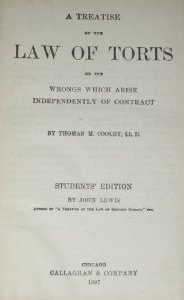Mens rea is principle
of law associated with law of crimes. It says that, in order to constitute a
crime mens rea is necessary. It must be accompanied with the actus reus (guilty
act). However, it is not so in case of torts.
However, some
qualification of the general statement is necessary. In torts, while ascertaining
the liability of the wrongdoer, unlike in crimes of assault, false
imprisonment, malicious prosecution, conspiracy or even battery, the state of
the mind of the person committing the offence is irrelevant.
In the tort of
negligence, certain amount of care is expected of a person and if he does not
take the expected care, then he is liable for the tort. However, if he took
expected care, then he will not be liable even if his act causes damage or
injury to the other person.
Hence, if the conduct
of a person is innocent in regard to the act done by him and injury is due to
the inevitable accident, then he may not be liable for the tort. Thus, an
injury caused to a drowning person in saving him and forcible feeding of a
prisoner who is on hunger strike are not actionable acts.
Outstanding feature of
law of tort is that the liability arises in some torts even when there is no
bad intention, no malicious intention or motive to cause harm or injury. Therefore,
if a statement made by a person turns out to be defamatory, he cannot take the
plea that, he had no intention to defame.
This proposition can
be illustrated with the help of the doctrine of strict liability in the light
of the Ryland v. Fletcher case. It says, if a person makes a non-natural
use of his land by collecting there something which is likely to do mischief on
escaping, then he will be liable if the thing escape and causes damage. In such
cases, he cannot take the defence that, he was not negligent in collecting it or
allowing its escape.



